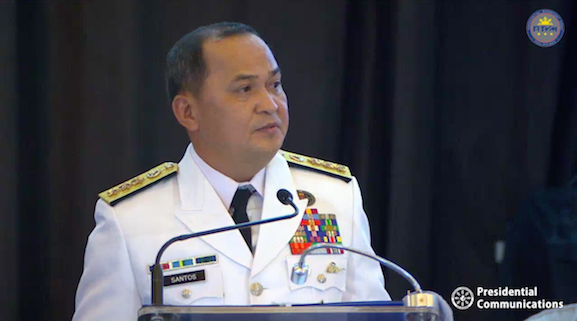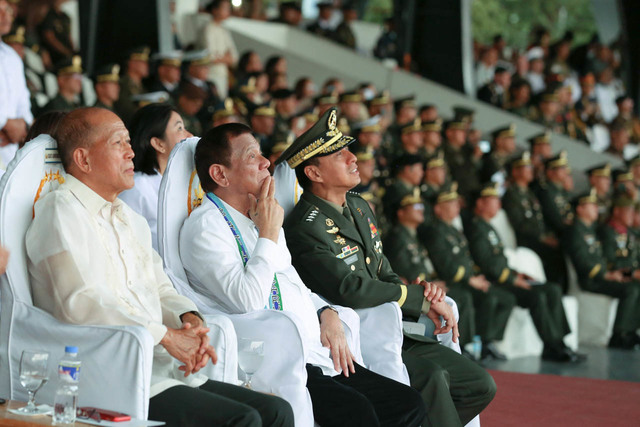(UPDATED) – Lieutenant General
Felimon Santos Jr is the 7th military chief to serve under President Rodrigo Duterte, and he will be on board for 7* months until he retires from the service in August, and then he will have to be replaced. Before Santos, General
Noel Clement was military chief for just over 3 months, until his retirement on January 5.
Before Duterte, Benigno "Noynoy" Aquino III had 6 military chiefs, practically one for every year of his term as president. Before Aquino, Gloria Macapagal Arroyo went through 11 military chiefs in her over 9 years in Malacañang.
This is the so-called
“revolving door policy” of presidents when appointing the chief of staff of the Armed Forces of the Philippines (CSAFP), a practice that became a trend in the post-Marcos era after 1986.
It is anchored on a law that requires the “compulsory retirement” of members of the military service once they reach the age of 56. The president may opt to extend their term for some time, but only under extraordinary conditions. Otherwise, no matter the position or circumstance, an officer’s time is up on his or her 56th birthday.
Job requirements
It’s a disservice to the service that even
Defense Secretary Delfin Lorenzana has acknowledged.
“The disadvantage of a brief stint is that there is not enough time for the CSAFP to really have his leadership felt by the organization. When a CSAFP retires, there is a ripple effect down the line as those commanders likewise may have stayed only a short time in their commands before going up the ladder of command,” Lorenzana told Rappler.
It takes a long time for officers to rise through the ranks of the military, gaining their stars and stripes from every assignment and posting along the way, until they are deemed ripe for top leadership posts: commanding general of the Army, flag officer-in-command of the navy, commanding general of the air force, and, of course, chief of staff of the entire organization.
It’s definitely the plum post, but being the CSAFP – second only to the president who is commander-in-chief – is a demanding job that takes getting used to.
“Normally, a CSAFP spends 6 months to one year familiarizing himself with his job, crafting a strategy or campaign plan, getting to know his commanders, getting to know his counterparts in the region, and visiting them,” Lorenzana said.
“The second and third year is spent to implement his plans and programs. He also participates in defense and security fora and conferences in the region and in other countries. The last 6 months of his term, he makes farewell visits to major AFP units and his counterparts in the region,” the defense chief added.
Imagine: Santos needs to do all these in 7* months. Clement had 3 months.
Since 2000, there have been 27 CSAFPs. Only 6 of them stayed beyond one year in the position. The longest within that period was General Hermogenes Esperon Jr, who was CSAFP for one year and 295 days, from July 22, 2006 to May 12, 2008. He is currently President Duterte’s national security adviser.
How did it come to be this way?
Well, military officers fall in line.
Just as militaries follow an inviolable chain of command, they also put a premium on seniority. The upperclassman gets priority. Presidents risk riling up the ranks should they pick junior officers to command their seniors, if only to have them around longer before they retire.
In the end, the president chooses from a list of the most senior – and oldest – officers.
At times, appointments are given as a reward for a display of loyalty, or for having shared history with the appointing power.
Although the military must, in theory, be apolitical, the reality is their career advancement, their salaries, and even their lives, can be controlled by the country’s political leaders.
The government’s
Official Gazette describes the period after World War II, when the newly-independent Philippines was organizing itself into a republic, and when the rapport between the military and the civilian government was taking shape:
“This was a period of great challenges to the Armed Forces as the country grappled with the Huk Rebellion, requiring reforms in the Armed Forces. It was also a period when a new generation of officers, who had only had junior rank during World War II, rose in seniority, and the Armed Forces as a whole grappled with the pressures of political accommodations with congressional and executive leaders due to officers having to be confirmed by the Commission on Appointments in Congress.”
It was former president Ferdinand Marcos who lowered the compulsory retirement age from 60 to 56 through Presidential Decree 1650 in November 1979. The decree did not clearly state why.
Interestingly enough, Marcos had the country’s longest-serving CSAFP: General Romeo Espino, from January 15, 1972 to August 15, 1981, or 9 years and 212 days. Those were the martial law years.
After the fall of the Marcos dictatorship in February 1986, former president Corazon Aquino appointed then-general Fidel Ramos as CSAFP. Ramos, together with then-defense secretary Juan Ponce Enrile, had sparked the People Power uprising that put her in power.
When Ramos retired from the military service less than two years later, Aquino appointed him defense secretary, and Ramos’ protégé, then-general Renato de Villa replaced him as CSAFP. Ramos became president after Aquino in 1992.
3-year term
To make the post of military chief matter morethan just a token appointment from the president to loyal generals, Lorenzana is repushing a proposal to give CSAFPs, service commanders, area commanders and other officers in sensitive posts a fixed term of 3 years – even if it means staying in active service beyond the age of 56.
A similar measure was
vetoed by former president Noynoy Aquino III in 2012, citing a legal impediment on extending the service of military officers, even if the 1987 Constitution actually sets a 3-year limit to the CSAFP’s term.
“While the AFP had been doing well ever since the 2000s when the term of the chief of staff and the service commanders is averaging less than one year, I believe the AFP could have done better if the CSAFPs have served a term of at least 3 years,” Lorenzana said.
“The most important reason for a longer and fixed term of the CSAFP is that it provides continuity and stability in the organization. He is also able to plan and implement programs and projects for the organization,” the defense chief added.
When Clement
assumed the top military post in September 2019, he could not promise anything much besides
“continuity.” With so short a stint as CSAFP, the least he could do was not cause a disruption before stepping down after the holidays.
But curveballs came up even during his 3 months – the fatal hazing and torture of
cadet 4th class Darwin Dormitorio that exposed the gruesome practice persisting at the Philippine Military Academy, and the proposed
revival of peace talks with communist rebels, which would have crucial ramifications on military operations against the New People’s Army.
Clement won’t be around to see both issues through, and Santos has 8 months to deal with them before passing it on to the next general.
Positives
If anything, the civilian government benefits from military generals retiring in their prime, the defense secretary said.
“The saving grace in retiring these excellent officers young is that they are eligible to work in the civilian government positions where they are currently performing very well. The loss of the AFP is the civilian government sector’s gain,” said Lorenzana, a retired Army general himself.
President Duterte has, in fact,
filled his Cabinet with ex-generals, saying he finds them dependable because of their training in the chain of command.
Long-term view
But Lorenzana’s concern is the military’s future, and in a world where global armed conflict does not seem as remote as it did a few years back, the Philippines could use a well-oiled defense establishment.
As the government spends billions of pesos acquiring new assets and weapons to build a credible military, the other aspect of “modernizing” the AFP is to rationalize how it is governed.
Always having a leader who’s bound to retire in a few months is counterproductive to that goal. As Lorenzana pointed out, other Southeast Asian countries’ military leaders stay on for an average of 3 years, even more. Only the Philippines has a revolving door for its generals.
“Our CSAFP, with very short time, cannot develop personal and professional relationships and network with his counterparts, which is vital in our defense engagements with our neighbors,” the defense chief said.
And those “neighborhood alliances” are crucial as
bigger powers close in on international and territorial waters, and as
terrorists from other parts of the world sneak in through thinly-patrolled borders.
Hence, the generals on top of the country’s security must be around for a longer term, long enough to have to see through their own decisions, and be accountable for them should anything go wrong, instead of conveniently slipping from public view with their retirement benefits. – Rappler.com
[Editor's Note: An earlier version of this story said General Felimon Santos will serve as military chief for 8 months. Santos will serve as chief of staff of the Armed Forces of the Philippines from January 4 to August 3. This has been corrected.]
https://www.rappler.com/newsbreak/iq/248480-quickie-generals-military-revolving-door-needs-shut


















